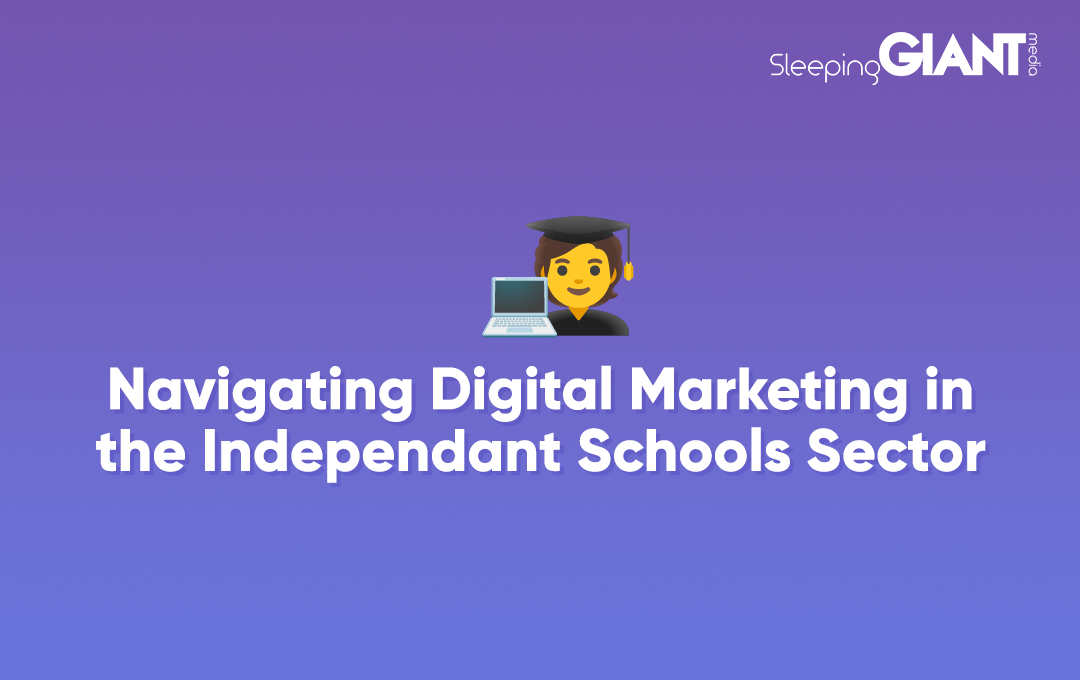
Navigating Digital Marketing in the Independent Schools Sector
Today’s digital landscape is almost as competitive as exam results tables. From different in-platform options for social media to ever-changing best practices for paid and creative campaigns, being top-of-the-class can seem like an impossible task.
So, for independent — or ‘private’ — schools looking to achieve their goals and reach their target audiences, digital can feel almost algebraic in its complexities. Luckily, a strong digital marketing strategy can provide all the answers (a bit like a cheat sheet). Knowing how best to plan, implement, and measure an effective marketing strategy, on the other hand, is the tricky part – that not everyone gets right.
In this article, we break down the unique challenges faced by organisations in the private education sector, while offering guidance on how to leverage digital marketing activity to overcome these challenges.
Independent school sector challenges
Competition
Increasingly, organisations in the private school sector must grapple with increased competition and reduced visibility in comparison to competing brands. This in itself presents a whole set of challenges, from maintaining relevance to curating originality — and then combining both to ensure an edge over the competition.
Digital dominance
Alongside this, digital really is one of the best marketing options for private schools, considering the substantial amount of time that students and families spend online nowadays. As such, the websites of these organisations are coming under higher levels of scrutiny than ever before. Content must be of an excellent standard, not to mention accurate and engaging, user experience should be strong, with fast load times and interactive pages, and sites should be informative for both parents and students alike.

User habits
What’s more, since most users begin their school search journey online, organic search is a vital component of independent school marketing. However, with the ever-changing landscape of SEO, independent schools must, like other businesses, keep on top of their site optimisation in order to maintain visibility on search engine results pages. Otherwise, these organisations run the risk of not appearing in organic search – and missing out on vital site traffic.
Putting all those things together then reveals how, when it comes to digital marketing, businesses in the private school sector have their work cut out for them.
Marketing success for schools
Before we dive into strategy, though, let’s talk about results. What is it that private schools need from their digital marketing strategies? If we bear these goals in mind, it becomes easier to work backwards and create a holistic, solutions-oriented strategy.
Despite a lack of regular “customers”, organisations in the private school sector are still businesses with plans and budgets. So, as expected, they have their own set of goals that might look something like this:
- Increase uptake and enrollment numbers. This can extend to certain areas or certain demographics too.
- Reputation management. This may look like enhancing prestige or building greater trust with audiences (particularly parents).
- Boost brand awareness in relevant circles, such as authority in the education sector against other institutions.
- Strengthen alumni and community engagement, particularly with parents, students, and other stakeholders.
- Greater visibility for achievements, such as league table results and exam results.
From here, more specific goals can be devised, such as:
- Improve the specificity of targeting in paid advertising campaigns.
- Enhance the quality and quantity of content output to position the school as a trustworthy expert in its field.
- Develop the social media presence of the school to reach new audiences and engage existing school members.
- Branch out into multimedia marketing such as email marketing, to give the brand a more personable feel, reaching alumni and other stakeholders individually.
- Conduct brand activities such as digital PR to heighten the prestige and perception of the school.
- Improve the school’s website content and functionality, making it easier for prospective students and parents to navigate.

What does an independent school’s digital marketing strategy look like?
Now that we know what common goals for independent schools are, how do we go about achieving them? First and foremost, through data-driven insights and a creative, joined-up approach to strategy.
Just like school uniforms, one size does not fit all when it comes to digital marketing.
So, any and all strategies will need to be tailored to the unique specifications of every school, based on budget, school or trust size, locations (and international connections), core aims, and site(s) size(s). The following activities could all be woven into a strategy:
Initial auditing
Before you can begin a digital marketing strategy of any kind, you need to know exactly where you’re starting from. So, an audit of your current site’s performance needs to be conducted. This can take the form of anything from top-level checks of your accounts to in-depth clustering of your creative content.
Strong foundations: Technical SEO
Once you’ve gained a greater understanding of the quality of your site and its content, it’s time to lay the groundwork for an effective strategy in the form of tracking and technical SEO. Adding in the right features and code to make sure your site is both easily navigable and measurable is somewhat of a cornerstone here.
Making sure your site loads fast enough, is functional, and that each page is accompanied by the right structured data is essential. There’s no point running creative campaigns and paying for paid activity to send users to your site if they’re just going to bounce off the landing page when they get there.
First impressions & E-E-A-T: Content optimisation
These all-important first impressions should also be managed by content. At the same time as your structured data should be tweaked, above this underground activity, your content should be optimised in line with SEO best practices.
Your content should:
- Give users a clear understanding of what you offer
- Encourage users to navigate further into your site, guiding them to convert and complete actions such as downloading a brochure or filling in a form
- Provide core and additional information about your services
- Inspire, wow, engage, and entice users
- Appeal to all audiences you are trying to target (not just a select few)
- Immediately convey the quality of your educational institution with clear, well-written, accurate content.
Additionally, the content on your site should also help your school appear in organic search results. As such, it should demonstrate Expertise, Experience, Authority, and Trustworthiness (or E-E-A-T), and target the relevant terms and phrases that your users are searching with.
Expertise and output: Creative content creation
As a supplement to the functional content on your site, you should also ideally produce a steady stream of timely, relevant, and engaging creative content. Why? Not only does this make your school seem more personable, but this content can be further atomised into social media posts and amplified across other channels, drawing in more organic traffic.
Creative content (or ‘blogs’) is also an ideal way to provide users with more information and celebrate your wins, doing a bit of ‘humble bragging’. For example:
- Celebrating your school’s latest results
- Showcasing position in league tables
- Discussing your school’s commitment to excellence or its other values
- Featuring your organisation’s commitment to sustainability
- Promoting upcoming events, like open days, or additional promotional activity

Brand authority enhancement: Digital PR
As an additional extra, many independent schools want to enhance the online presence of their unique brand. Here, the goal is often to make their institution seem more prestigious or well-known in the sector.
If this is your goal, we recommend considering digital PR activity, to reach online communities and independent school-specific publications in the hope of featuring, or obtaining brand mentions and/or backlinks.
Audience targeting: Paid activity
Paid activity is quite frankly a huge umbrella term used to refer to any paid social media or PPC (Pay Per Click) activity. It can be used to promote your school and direct users back to your site through targeted ads.
By using tools such as Google Ads and in-platform features, select paid marketing campaigns can be set up for everything from always-on brand activity to seasonal open days.
These can be targeted to reach any audience based on demographics, interests, online behaviours, locations, previous exposure to your brand and more. So, while organic activity casts your nets wide, paid allows you to use tactics that draw in the most relevant, valuable users.
However, it is an effective combination of the two that brings in the most success for independent schools, as content that is promoted generally does better than just organically, but paid campaigns without quality content will likely get an F!
Audience Engagement: Organic social media
Once you’ve reached new audiences, it’s crucial to hold their attention and prompt some engagement.
Authenticity is a huge factor for organic social success at the moment. So, it is crucial that the tone and style of your posts match exactly that which your audience expects of you. This can be a tricky job, balancing responsibility with enthusiasm. As such, this is often a pitfall for many independent schools who choose to play it ‘too safe’ – to their detriment.
Remember, if you are looking to attract young people to your school, you will — at least at some point in the marketing funnel— have to engage them. And where better to engage them than on the platforms they (or their parents) may well already be using?
Similarly to regular creative content production, posting regularly on social media will also make your brand seem more of a hub, to ensure the audiences you have obtained remain engaged and satisfied.
Measuring results: Data & tracking
Finally, no strategy can ever truly be deemed successful in the absence of reliable, measurable data. Establish what metrics you want to measure early on and ensure that you have set up the tracking for them, reporting on a regular basis — not just for the sake of consistency or for your board of directors — but so as to make informed strategy changes off the back of your findings.
Our results
In our 15 years of offering digital marketing delivery, insight, and education, we’ve collaborated with prestigious educational institutions to achieve some industry-leading results.
Using a strategic blend of our services, tailored to each school and its aspirations, we’ve undertaken some impressive marketing activity for businesses across the independent school sector.
To give you just a snippet of our success stories, let’s shine a spotlight on our work for Cognita Schools. Through a combination of technical SEO activity, content optimisation, and targeted paid activity, we achieved the following:
- +168% Google Ads click-through rate YoY
- -31.6% Google Ads CPA YoY
- 54.52% conversion target exceeded across all schools
See how we’ve achieved marketing success for clients in other sectors too.
Want to be top of the class in the independent school sector?
It might have been a while since our experts sat their GCSEs, but they are straight-A-students when it comes to implementing marketing strategies that get results. From targeting PPC campaigns to custom ads on social media platforms, we can elevate all arms of your independent school’s digital strategy.
Contact us to discuss your school’s marketing objectives today or, for more expert advice, keep up to date with our blog.
Blog
Everything you Need to Know About the March Core Update
We knew it wouldn’t be long before Google released their first core update of...
Giant Wednesday
How To Optimise Images For Websites
Digital Marketing, technology & business insights, how-to's and explainer...
Follow Us
Sign Up For More
Stay up to date with the latest happenings, learnings, events & more with our GIANT Newsletters.
Contact Us
Top Floor, The Civic Centre, Castle Hill Avenue, Folkestone CT20 2QY.




